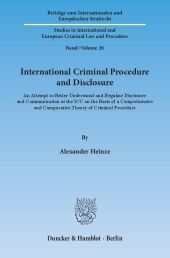 Neuerscheinungen 2014Stand: 2020-02-01 |
Schnellsuche
ISBN/Stichwort/Autor
|
Herderstraße 10
10625 Berlin
Tel.: 030 315 714 16
Fax 030 315 714 14
info@buchspektrum.de |

Alexander Heinze
International Criminal Procedure and Disclosure
An Attempt to Better Understand and Regulate Disclosure and Communication at the ICC on the Basis of a Comprehensive and Comparative Theory of Criminal Procedure. Dissertationsschrift
2014. 599 S. Abb.; 599 S., 34 schw.-w. Abb. 233 mm
Verlag/Jahr: DUNCKER & HUMBLOT 2014
ISBN: 3-428-14343-4 (3428143434)
Neue ISBN: 978-3-428-14343-6 (9783428143436)
Preis und Lieferzeit: Bitte klicken
Alexander Heinze untersucht die unterschiedliche Interpretation der Beweisoffenlegungsregelungen vor dem Internationalen Strafgerichtshof (IStGH) und schlägt ein neues System der Beweisoffenlegung vor. Dieses ist das Resultat einer konsequenten Anwendung des IStGH-Statuts auf der Grundlage einer einheitlichen allgemeinen Rechtslehre, die der Autor im Zuge seiner Arbeit entwickelt. Aufwendige philosophische und rechtstheoretische Überlegungen werden so mit einer relevanten und praktischen Fragestellung verknüpft.
"International Criminal Procedure and Disclosure" analyses the different interpretations of disclosure rules at the International Criminal Court (ICC) and introduces a new disclosure regime, where the parties will be able to actually foresee the consequences of their conduct (i.e. non-disclosure). Through a critical case law analysis Heinze illustrates that an inconsistent classification of the nature of the ICC-process has - via the application of a contextual interpretation - a direct impact on decisions about concrete procedural issues, of which disclosure is the most prominent example. For this very reason Heinze re-classifies the ICC-process and concludes that the ICC is a hierarchically structured international organisation with a "policy-implementing" form of procedure, that nevertheless contains adversarial elements usually found in a system of coordinate authority with a "conflict-solving" form of justice. This classification serves as a "general jurisprudence" in its technical sense, which enables the Judges to conduct a coherent contextual interpretation. The book thereby establishes a connection between legal theory, philosophy, sociology and comparative law on the one hand and a highly relevant procedural question on the other hand.
A. Introduction and Abstract
The Problem - Methodology
B. The Four Issues
Introduction - Truth and the Pre-Trial Chamber - Exculpatory Evidence - Analysis of the Relevant Evidence - General Communication Obligations: Broad or Narrow
C. Case-by-case Approach or Consistency
The Problem of the Case-by-case Approach - So What? Or: Is Consistency Necessary?
D. How to Interpret the Law at the ICC - Methodology of the ICC?
Sources - Interpretation - Finding or Justification
E. Interpretation of the ICC Disclosure Regime
The Applicable Law - Methods of Interpretation - A New Contextual Interpretation - Damaska and ICC Procedure
F. Prosecution Disclosure Before the ICC from a Comparative Perspective with a View to Damaska´s Models
Approach - General - Disclosure Obligations Independent from Trial Stages: Exculpatory Material - Disclosure Obligations Independent from Trial Stages: Documents and Tangible Objects - Disclosure Obligations Independent from Trial Stages: Prior Statements of the Prosecution Witnesses and Names of Witnesses - Prosecution Disclosure Prior and at the Confirmation Hearing - Sanctions - Conclusion
G. The Solution
Active Judge - The Parties and the System in General - Communication and Registration - Summary and Concluding Remarks
Bibliography
Subject Index


